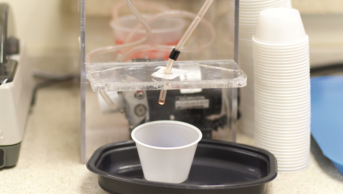
istockphoto.com
Becoming the trustee of a charity is something many pharmacists do, but most leave it until later in their career, when they may either be able to work part-time or have retired. However, those who do it say that, with hindsight, they wish they had got involved much earlier. Not only do they like feeling that they are giving time to a charity, but they say that being a charity trustee offers a pharmacist an invaluable opportunity to gain experience and skills that could help them in their own career — particularly if they have their eye on a management or advisory position.
What does being a trustee involve?
Trustees must fulfil legal duties, outlined in detail by the Charity Commission
[1]
and summarised in ‘The duties of a trustee’.
The duties of a trustee
- Ensure that the charity is carrying out its purpose for the public benefit, which is set out in the charity’s governing document of the charity, and that its funding is being spent within those objectives;
- Ensure the charity complies with its governing document and the law;
- Act in the charity’s best interest rather than your own and ensure you do not receive any benefit from the charity unless it is properly authorised and is clearly in the charity’s interests;
- Manage the charity’s resources responsibly and act responsibly, reasonably and honestly;
- Act with reasonable care and skill;
- Ensure the charity is accountable and comply with statutory accounting and reporting requirements.
Peter Noyce, chair of charity Pharmacist Support, says: “Trustees do need to be clear about their role. They are responsible for the appropriateness of the governance arrangements and for setting and monitoring the strategic direction.” Larger charities will employ permanent staff and it is this workforce that is accountable for actually achieving those aims. “I think some pharmacists wrestle with clarity of these roles and are itching to get involved with operational activities,” he explains.
Charities will be looking for certain skills, particularly skills in planning, service development, governance, and performance and financial management. Noyce, who is professor of pharmacy practice at the University of Manchester, says many pharmacists will have experience in one or more of these areas.
Trustees will be expected to attend trustee board meetings once every two months, the annual general meeting, and perhaps other meetings or events. The time commitment is therefore likely to be at least one day every two months to attend meetings, plus preparation time. Most trustees estimate that in total this means they spend around two days per month working for the charity.
“Beyond that it is about how much time that trustee is willing to give,” says Steve Churton, a trustee of the Psoriasis Association and Pharmacy Research UK. For example, the Psoriasis Association has recently recruited some permanent staff and, because of his skills in recruitment gained as former head of professional practice at Boots, Churton has been involved and contributed an extra four or five days.
“I do think you have to recognise the minimum requirements. You have to satisfy yourself that you can do that, but I also think to get more out of the charity you have to give more to the charity,” says Churton, who is also a past president of the Royal Pharmaceutical Society of Great Britain and a past chair of Pharmacist Support.
But charities do recognise that younger trustees have work commitments and make allowances for that, says Christine Gibbons, vice chair of Pharmacist Support and deputy chair of St Ann’s Hospice. “When I was working I put in far less time into a charity than now I am retired. I think charities are quite flexible, if you are the right person and they want your expertise.” For example, when Gibbons, who began her career as a pharmacist then moved to hospital management, was working full time, she was let off the commitment of joining a subcommittee at St Ann’s Hospice. These days, some subcommittees also meet virtually via Skype.
Churton advises pharmacists who are considering getting involved not to commit to too many charities. “My advice would be to choose one or two charities that you are really interested in and devote whatever time you have got to those,” he says. “I think the danger is you spread yourself too thinly. Not only do the charities not get full use of you as a trustee, but actually you end up not spending enough time with the charity in order for you to benefit as well.”
Broadening your knowledge
Being a trustee has a number of potential benefits for someone earlier in their career, Churton points out. “First of all it gets you into an environment which perhaps you would not get into otherwise. So it gets you out of your normal day job and gives you another perspective on an area that perhaps you have not touched before. From the point of view of broadening your knowledge, that is good for you.”
One of the dangers for specialised professions, such as medicine and pharmacy, is that people tend to spend a lot of time with people like themselves, Noyce warns, which can give them a narrow perspective. “It is almost like painting the hallway through the letterbox. You have got that narrow perspective of how you see the world because that is what you have been exposed to.” Being involved with a charity as a trustee enables pharmacists to widen their social circle and their perspective as a result.
Trustees come from a wide range of different backgrounds, and you will start to develop skills just by watching how these people operate and use the experience they bring to the table, Churton explains. “That could be useful to somebody who is early in their career. They start to develop interactive meeting skills and, maybe, chairing skills as well. You might be asked to chair a small task group or something, away from the main board, that would give you some experience in terms of leading a project.”
He adds that many pharmacists follow one-track careers — they generally either work in the private or the public sector. Someone who can also demonstrate experience of another sector will come across as “a more rounded person”, he says. “That makes you a more attractive candidate for future career opportunities.”
Noyce says working in a charity provides “the opportunity to work within a team and also see an organisation from top to bottom in terms of how you set a strategic direction and how that is secured through financial performance management”.
“If I was looking for someone coming in for a management role within pharmacy, I would rate that sort of experience highly,” he says.
Being a trustee also obviously demonstrates “a commitment to charitable service — that you are prepared to do something for nothing and also that you feel sufficiently strongly and committed about something that you are prepared to make a difference in your own time”, he adds.
Becoming a trustee
So how would a young pharmacist go about getting their first charity trustee position?
Most pharmacist trustees begin with a local charity, often a hospice (see ‘Case studies’). This is what Gibbons did. She recommends that pharmacists approach the charity they are interested in, and perhaps get involved as volunteer or a donor initially to get to know the charity and demonstrate their interest.
One advantage of local charities is that meetings are often scheduled for later in the day or the evening, so trustees probably will not need to take as much time off work, she adds. “With a national charity it can be quite a commitment if you are not living in London,” says Gibbons. Most national charities hold their board meetings in London, although some do spread them across the country, she adds. “The worst thing for charities is that you start and then cannot commit,” she says.
National charities are perhaps a second step because there tends to be more competition for these posts. Many national charities will use recruitment agencies to find people with the right skills and experience, and Gibbons, who is now vice chair of Hospice UK and a trustee of the MS Society, recommends that pharmacists keen to find a trustee position register their interest with such agencies.
Noyce emphasises that the national charity Pharmacist Support, where the majority of trustees are pharmacists, would welcome more young pharmacists because they would have a lot to contribute. Many individuals preparing for practice (pharmacy students and preregistration trainees) contact the charity for support and younger pharmacists are likely to have had more recent and relevant experience of the issues they raise, he says.
Case studies
Trustee of a hospice: Bill Gould
Bill Gould became a trustee of Teesside Hospice in 1982 when he was pharmaceutical officer for Cleveland Area Health Authority. He was approached a group of community health council members who asked him to help them set up a hospice. They were familiar with his planning skills from attending meetings and admired them. “They liked my plans, because they could understand them,” he explains.
Gould went on to chair the board of trustees for many years and says he learnt a lot from working with the other trustees, who had different backgrounds, philosophies and approaches. As well as skills in business practice, he also picked up skills in human resources, health economics and charity law.
Working in an NHS repeatedly being reorganised, Gould also found that the charity provided a useful escape. “If we were having a tough time in the NHS it would quite often happen that things were going well in the hospice — and that is quite a morale booster,” he says.
“I come from a generation where voluntary work was normal,” says Gould. “I think it is good for society and the individual gains from it.”
Trustee of youth charity: Mike Ellis-Martin
Mike Ellis-Martin, senior lecturer in pharmacy practice at the School of Pharmacy and Biomolecular Sciences at the University of Brighton, is a trustee of the Rebecca Seymour Foundation.
Rebecca Seymour was a coach at Brighton and Hove Athletics Club who died in a road accident, and the foundation was set up by her friend Natalie McManus in memory of her.
Rebecca was supportive of new young members, particularly those who were vulnerable, perhaps as a result of bullying or because of low self-esteem. “The idea was that the charity would be set up in order to help the club to be of help to those individuals and find a practical way of doing that,” Ellis-Martin explains. “Natalie asked me to become a trustee of the charity and to have some involvement because I was chairman of the athletics club at the time.”
The Rebecca Seymour Foundation aims to ensure that vulnerable youngsters have a point of contact at the club when they first arrive. This will ideally be a younger member “on the same sort of wavelength”, who can act as ambassador and can be a point of call for new members if they need any kind of help or support. The charity has been running for a year and currently supports four youngsters. Athletics can help youngsters struggling with low self-esteem, says Ellis-Martin. “It makes you feel confident in yourself and it gives you a real interest,” he adds.
Being involved with a charity allows you to build a connection with at least one section of the community, says Ellis-Martin, who was a community pharmacist for 15 years. “I remember what the situation was like when you felt fairly isolated in your work and there are times when you can feel like you are just in your own and not really involved with the community in the sense of not being able do more than what you do in the retail environment.”
Before Ellis-Martin joined the charity he was already involved in the athletics club and involved with volunteering. “If I had still been working in the community and then became a trustee it would have made a huge difference for me,” he believes, because it would have enabled him pick up project management skills helpful to his career. Pharmacists employed in community pharmacy rarely get the chance to set up and run projects, he points out. “Obviously if you own the premises, there are projects that you can set up. As an employee, you do not have that same level of involvement.”
Setting up a charity involves lots of challenging and practical tasks. “It gives you a sense of the real world and what it is like to be setting up a new organisation. It gives you a sense of satisfaction in the sense of what you hope to achieve,” he explains.
“The principles behind the charity are things that I believe in and I want to achieve in a context that is different from any other area of my life, so that does give you a new purpose and it is satisfying.”


